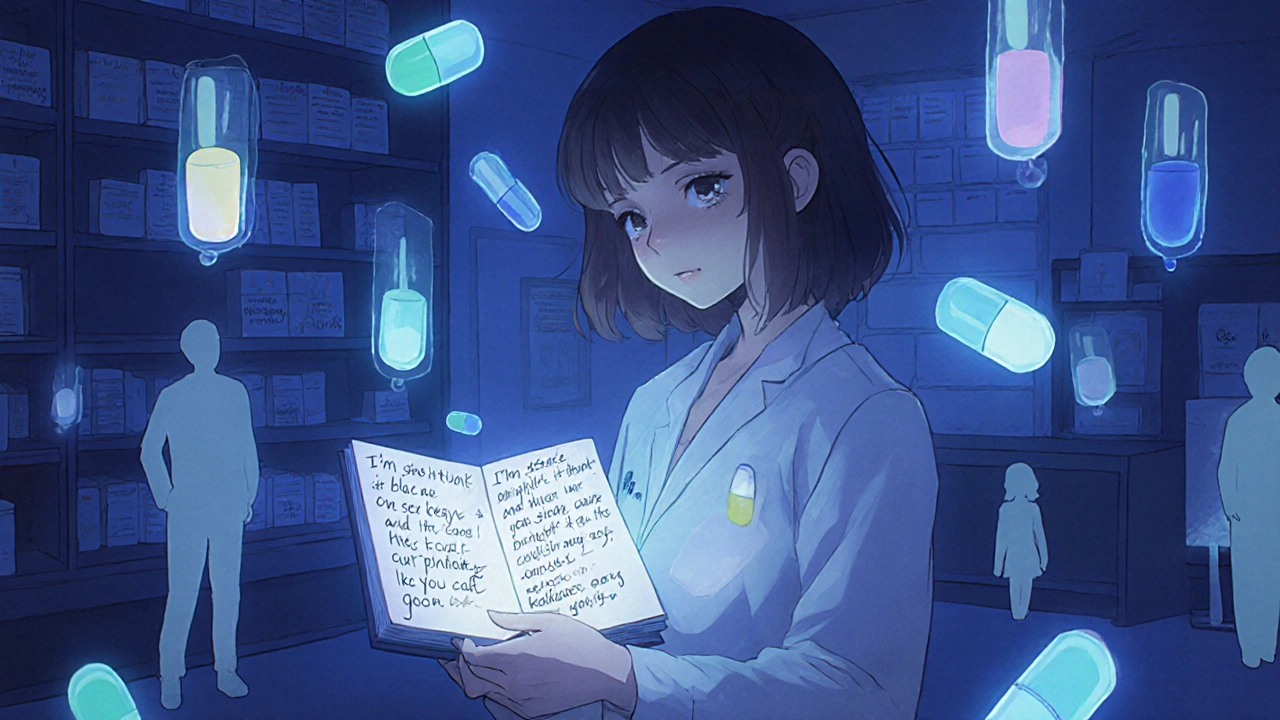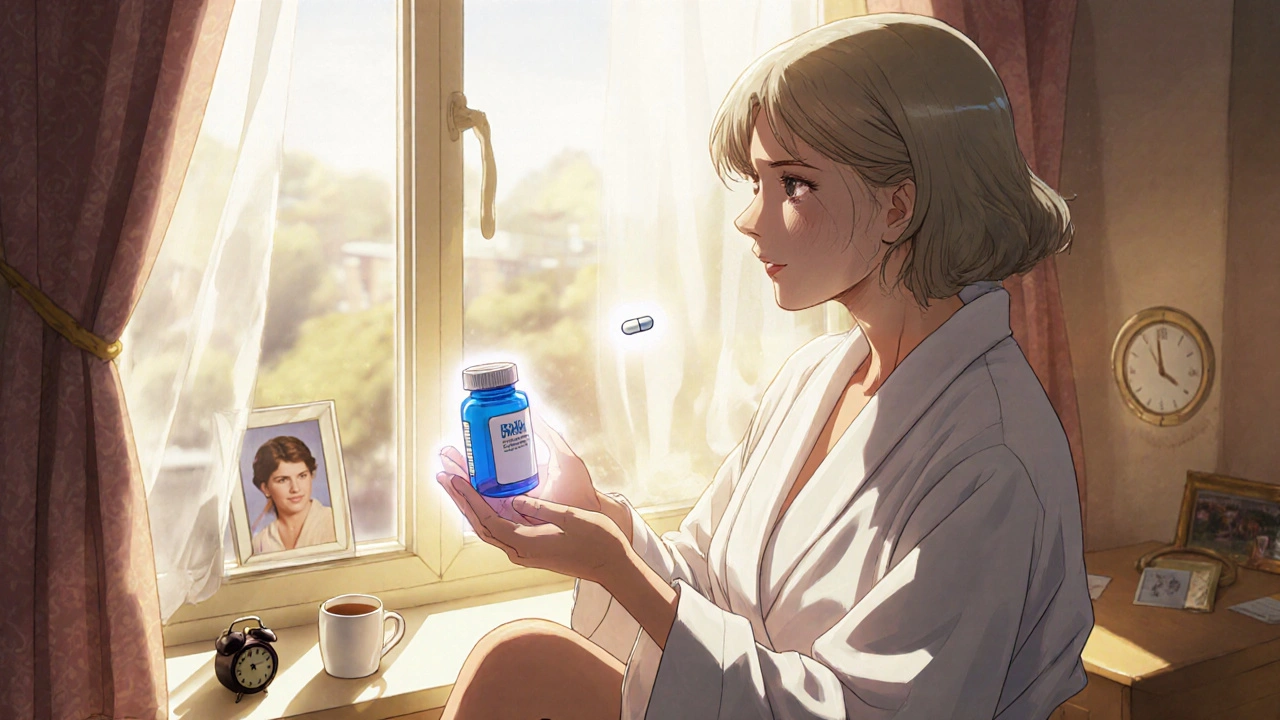What if the reason you won’t take your generic pill isn’t about price - but about meaning?
You’ve been prescribed a generic version of your medication. It’s cheaper. It’s FDA-approved. Your doctor says it’s just as effective. But you still hesitate. You don’t trust it. You feel like you’re being handed something second-rate. You’re not alone. And the reason isn’t always science - it’s story.
Narrative medicine isn’t about poetry or literature for its own sake. It’s about listening. Really listening - to how patients describe their illness, their fears, their hopes. And when those stories are ignored, even the most scientifically sound treatment can fail. That includes generic medications. People don’t reject generics because they’re ineffective. They reject them because they feel invisible in their own care.
Dr. Rita Charon, the physician and literary scholar who started narrative medicine at Columbia University in 1996, noticed something broken in medical training. Doctors were taught to diagnose, treat, and move on. But they weren’t taught to hear the silence between a patient’s words. The way someone says, ‘I’ve been sick for years,’ with their eyes down, or how they clutch their pill bottle like it’s a lifeline - those aren’t distractions. They’re data.
When a patient says, ‘This brand made me feel better,’ it’s not just placebo. It’s a lived experience. Their body, their memory, their identity are tied to that blue capsule with the logo they’ve seen for 15 years. Switching to a white oval pill with no brand name doesn’t just change the packaging - it changes their story. And if that story isn’t honored, acceptance drops.
Why generics feel like betrayal - even when they’re not
Think about your morning coffee. You’ve had the same blend for years. You know the smell, the texture, the way it warms you. One day, your favorite shop switches to a cheaper, store-brand bean. Same roast level. Same caffeine. But it tastes… off. Not because it is. Because you lost the ritual. The identity. The story.
That’s exactly what happens with medications. Patients don’t just take pills. They build routines around them. They associate the shape, color, size, even the bottle with safety. When a doctor says, ‘We’re switching you to generic,’ without explaining why or acknowledging what that change means, patients hear: ‘Your experience doesn’t matter.’
A 2023 study in The Permanente Journal found that patients who felt heard by their providers were 68% more likely to stick with prescribed treatments - including generics. Why? Because being listened to isn’t just nice. It’s therapeutic. It tells the brain: ‘You’re still in control. Your story still counts.’
One woman in her 60s, prescribed a generic version of her long-term blood pressure med, stopped taking it for three months. When asked why, she said: ‘It wasn’t the same. My body didn’t recognize it.’ Her doctor dismissed it as ‘psychological.’ But in narrative medicine, that’s not psychology - it’s physiology. The body remembers. The mind remembers. And if the story changes without consent, the body rebels.
How doctors can turn ‘generic’ into ‘trusted’
It’s not about convincing patients generics are ‘just as good.’ It’s about helping them rewrite the story.
Here’s how it works in practice:
- Ask first. Instead of announcing the switch, say: ‘I’d like to talk about your current medication. What’s worked for you? What’s been hard?’
- Listen without interrupting. Let them describe the pill. The bottle. The time of day. The way it made them feel. Don’t rush to fix it.
- Validate. Say: ‘It makes sense that you’ve built your routine around this pill. That’s important.’
- Reframe. ‘The generic version has the same active ingredient. The only difference is the name on the bottle. But your body still gets the same help. And we can make sure the new one fits into your routine - same time, same size, same color if possible.’
- Invite them in. ‘Would you be open to trying it for two weeks? We can check in and see how it feels for you.’
This isn’t fluffy. It’s evidence-based. At the University of Kentucky, patients in narrative medicine sessions reported a 40% increase in treatment adherence after their stories were actively included in care planning. The VA Whole Health Library trains clinicians to ‘unpack metaphors’ - like when a patient says, ‘This pill feels like a stranger.’ That’s not nonsense. It’s a signal. The patient doesn’t feel safe.
One nurse in a rural clinic started asking her diabetic patients: ‘What does your insulin mean to you?’ One man said, ‘It’s the only thing that keeps me from losing my legs.’ She realized he’d been on the same brand for 12 years. When she switched him to generic, she didn’t just hand him a new bottle. She sat with him. Asked him to describe the old one. Then she said: ‘We’re keeping your routine. Just changing the label. Your legs still matter. And so does your story.’ He took the new pills. And kept taking them.

The hidden cost of ignoring stories
Ignoring narrative doesn’t just hurt patients. It burns out doctors.
More than half of pediatric residents in the U.S. show signs of burnout, according to the same 2023 study. Why? Because they’re told to ‘fix’ problems - not sit with them. They’re trained to see symptoms, not stories. When patients don’t follow through, doctors feel like failures. But the failure isn’t the patient’s. It’s the system’s.
Narrative medicine flips that. It teaches clinicians to see their own exhaustion as part of the story. When a doctor says, ‘I’m tired of patients not taking their meds,’ what they’re really saying is: ‘I feel powerless.’
At Columbia, medical students do weekly reflective writing. They write about the patient who cried when they got their generic prescription. The one who said, ‘I used to feel like a person when I took this.’ The one who didn’t say anything at all.
Those writings aren’t therapy. They’re training. They build what Charon calls ‘narrative competence’ - the ability to absorb, interpret, and act on stories. And that competence reduces burnout. It turns frustration into connection.
When doctors feel heard, they listen better. When patients feel heard, they take their meds. It’s a loop. And it starts with one question: ‘Tell me about your pill.’
How narrative medicine is changing the game - one story at a time
Narrative medicine isn’t just for big hospitals or Ivy League programs. It’s spreading. Medical schools from Boston to Birmingham now include narrative training in their first-year curriculum. Nurses, pharmacists, and social workers are being trained to ask the right questions.
At a community pharmacy in Bristol, a pharmacist started keeping a small notebook. Every time someone asked about switching to generic, she wrote down their reason - not in clinical terms, but in their own words. ‘I’m scared it won’t work like the blue one.’ ‘My mom took this for 20 years.’ ‘I don’t trust anything without a name.’
She didn’t change the policy. But she changed the conversation. When a patient came in nervous, she’d say: ‘I’ve heard others say the same thing. Would you like to talk about it?’
Within six months, generic adherence in her pharmacy rose by 31%. Not because prices dropped. Not because ads ran. Because someone finally asked: ‘What does this mean to you?’
This is the power of narrative medicine. It doesn’t replace science. It deepens it. It doesn’t make doctors into therapists. It makes them more effective clinicians.
Generic medications aren’t inferior. But they’re not neutral either. They carry meaning. And if we ignore that, we’re not just losing compliance - we’re losing trust.

What you can do - whether you’re a patient or a provider
If you’re a patient:
- Don’t be afraid to say: ‘This pill feels different to me.’
- Bring your old bottle to your appointment. Show it. Describe it.
- Ask: ‘What’s the difference between this and the brand?’ Not ‘Is it the same?’ - because you already know it is. Ask how it fits into your life.
If you’re a provider:
- Start every medication conversation with: ‘Tell me about the one you’ve been taking.’
- Don’t correct. Don’t explain. Just listen. For a full minute.
- Use the patient’s own words when explaining the switch. ‘You said the blue pill made you feel steady. This one has the same active ingredient. We’ll keep it in the same spot on your counter.’
- Track outcomes. You’ll see adherence improve.
If you’re a pharmacist, nurse, or caregiver:
- Keep a quiet record of patient stories. Not for charts - for yourself.
- Notice patterns. What do people fear most? Loss of control? Feeling forgotten? That’s your entry point.
- Speak up. If your clinic doesn’t train in narrative skills, ask why.
Change doesn’t come from new drugs. It comes from new conversations.
Frequently Asked Questions
Is narrative medicine just about talking, or does it actually improve health outcomes?
It’s not just talking - it’s structured listening that leads to measurable results. Studies show patients who feel heard are significantly more likely to stick with treatments, including generics. One study found a 68% increase in adherence when providers used narrative techniques. Clinicians also report lower burnout and higher job satisfaction. It works because it addresses the human side of medicine - the part that science alone can’t fix.
Can narrative medicine help with stigma around chronic illness?
Yes. When someone with diabetes, depression, or arthritis is allowed to tell their story without judgment, it reduces shame. Many patients feel like their illness defines them as ‘difficult’ or ‘non-compliant.’ Narrative medicine flips that. It says: ‘Your experience matters. You’re not a problem to solve - you’re a person to understand.’ This shift helps patients accept their condition not as a failure, but as part of their life story.
Do I need special training to practice narrative medicine?
You don’t need a degree, but you do need practice. Start with small steps: pause before responding. Ask open-ended questions. Don’t jump to fix things. Many hospitals and clinics now offer free workshops on listening skills and reflective writing. Even five minutes of intentional listening per patient can make a difference. It’s a skill, not a magic trick.
Why do some doctors resist narrative medicine?
Some see it as time-consuming or ‘unscientific.’ But that’s a misunderstanding. Narrative medicine doesn’t replace labs or guidelines - it enhances them. Doctors who use it report faster diagnosis, fewer missed concerns, and stronger patient relationships. The resistance often comes from a system that rewards speed over depth. But as burnout rises and adherence drops, more providers are realizing: listening isn’t a luxury. It’s a necessity.
How is narrative medicine different from just being empathetic?
Empathy is feeling with someone. Narrative medicine is actively working with their story. It’s not just saying, ‘I’m sorry you’re going through this.’ It’s asking, ‘What did that feel like?’ and then using what you hear to shape care. It’s structured, repeatable, and evidence-based. You don’t just feel - you interpret, reflect, and act. That’s what turns compassion into change.
Next steps: Where to begin
If you’re a patient and want to bring narrative medicine into your care, start by writing down your medication story. What does your pill look like? When do you take it? What does it mean to you? Bring that to your next appointment.
If you’re a provider, try this tomorrow: pick one patient and ask them, ‘Tell me about your current medication.’ Then stay quiet for 60 seconds. Don’t interrupt. Don’t fix. Just listen. You might be surprised what you hear - and how much it changes everything.

Linda Rosie
November 21, 2025 AT 15:46